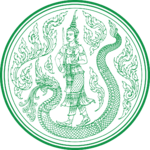Ministry of Agriculture and Cooperatives (Thailand)
| กระทรวงเกษตรและสหกรณ์ | |
|
The Seal of Varuna on Naga's Back | |
| Ministry overview | |
|---|---|
| Formed | 1 April 1892 |
| Jurisdiction | Government of Thailand |
| Headquarters | Phaya Thai Road, Ratchathevi, Bangkok 10400 |
| Annual budget | |
| Minister responsible |
|
| Website | www.moac.go.th |
The Ministry of Agriculture and Cooperatives (Thai: กระทรวงเกษตรและสหกรณ์; rtgs: Krasuang Kaset Lae Sahakon; Abrv: MOAC) is a cabinet ministry in the government of Thailand. The ministry is one of the oldest ministries in the government, tracing its existence to the 14th century. The ministry is responsible for the administration of agricultural policies, forestry, water resources, irrigation, promotion and development of farmers and cooperative systems, including agricultural manufacturing and products. As Thailand is an agricultural country with a strong agrarian tradition, the ministry is one of the most important departments in the government. The ministry is headed by a Minister of Agriculture and Cooperatives. As of November 2016, the minister was General Chatchai Sarikulya.[4]
History
During the Kingdom of Ayutthaya one of the king's four ministries was the "Kromma Na" (Thai: กรมนา) or Farm Ministry. Created in 1350, the ministry was responsible for the prevention and resolution of conflicts over rice, other crops, and livestock. Eventually the ministry gained more powers from the king to manage land reformation, irrigation and livestock, collecting broken rice grains for the royal granary, management of the king's land holdings, solving conflicts over land ownership, and appointment of officers to provincial towns.[5]
During the Rattanakosin era and later periods, the name of the ministry changed several times. In 1892 its name changed to the "Ministry of Kasetpanichakarn"; in 1898 to the "Ministry of Kasettrathikarn"; in 1932 to the "Ministry of Kasetpanichayakarn"; in 1933 to the "Ministry of Setthakarn"; in 1935 to the "Ministry of Kasettrathikarn"; in 1952 to the "Ministry of Agriculture"; and finally to its current name, the "Ministry of Agriculture and Cooperatives" in 1972.[6]
Criticism
The ministry has drawn criticism from observers who charge, among other things, that, "The Agriculture Ministry has...become the mouthpiece for agro giants—and agricultural officials their salesmen." The criticism arises from Thailand's profligate use of farm chemicals. According to the World Bank, Thailand is the world's fifth largest user of farm chemicals, although its arable land ranks only 48th in the world. About 70 pesticides used in Thailand are banned in the West.[7]
According to the Thai government's The Eleventh National Economic and Social Development Plan (2012-1016), Thailand is number one in the world in the application of chemicals in agriculture. The report stated, "The use of chemicals in the agricultural and industrial sectors is growing while control mechanisms are ineffective making Thailand rank first in the world in the use of registered chemicals in agriculture."[8]:111
Departments
Administration
- Office of the Minister
- Office of the Permanent Secretary for Agriculture and Cooperatives [9]
- Kasetradhikarn Institute
- Bureau of Royal Rainmaking and Agricultural Aviation
Dependent departments
- Department of Agricultural Extension
- Agricultural Land Reform Office
- Department of Agriculture
- Rubber Research Institute
- National Bureau of Agricultural Commodity and Food Standards
- Office of Agricultural Economics
- Cooperative Auditing Department
- Cooperative Promotion Department
- Department of Fisheries
- Land Development Department
- Department of Livestock Development
- The Royal Irrigation Department
- Rice Department
- The Queen Sirikit Department of Sericulture [9]
State enterprises
- Dairy Farming Promotion Organization of Thailand
- Fish Marketing Organization
- The Marketing Organization for Farmers
- Rubber Estate Organization
- Office of Rubber Replanting Aid Fund
Public organizations
- Agricultural Research Development Agency (Public Organization)
- Highland Research and Development Institute (Public Organization)
- The Golden Jubilee Agricultural Museum (Public Organization) [9]
See also
- Agriculture in Thailand
- Bank for Agriculture and Agricultural Co-operatives
- Cabinet of Thailand
- Economy of Thailand
- Government of Thailand
- List of Government Ministers of Thailand
References
- ↑ "Phrarātchabanyan ngoppramān rāičhāi pračham pīngoppramān phutthasakkarāt sǭng phan hā rǭi hāsip kāo" พระราชบัญญัติงบประมาณรายจ่ายประจำปีงบประมาณ พ.ศ. ๒๕๕๙ [Annual Expenditure Budget Act 2016] (PDF). Government Gazette of Thailand (in Thai). Bangkok: Cabinet Secretariat of Thailand. 132 (91 A): 82. 2015-09-25. Retrieved 2016-09-15.
- ↑ "Phrarātchabanyan ngoppramān rāičhāi pračham pīngoppramān phutthasakkarāt sǭng phan hā rǭi hoksip" พระราชบัญญัติงบประมาณรายจ่ายประจำปีงบประมาณ พ.ศ. ๒๕๖๐ [Annual Expenditure Budget Act 2017] (PDF). Government Gazette of Thailand (in Thai). Bangkok: Cabinet Secretariat of Thailand. 133 (84 A): 88. 2016-09-23. Retrieved 2016-09-23.
- ↑ "Executive 2558". Ministry of Agriculture and Cooperatives. Retrieved 18 October 2015.
- ↑ Wipatayotin, Apinya; Seehawong, Chudet (17 November 2016). "Prayut assures farmers' income will increase over next 5 years". Bangkok Post. Retrieved 19 November 2016.
- ↑ "Ayutthaya Period". Ministry of Agriculture and Cooperatives. Retrieved 18 October 2015.
- ↑ "Early Rattanakosin Period". Ministry of Agriculture and Cooperatives. Retrieved 18 October 2015.
- ↑ Ekachai, Sanitsuda (26 November 2016). "Organic rice a saviour for struggling farmers". Bangkok Post. Retrieved 26 November 2016.
- ↑ The Eleventh National Economic and Social Development Plan (2012-2016). Office of the National Economic and Social Development Board. 26 October 2011. Retrieved 1 April 2016.
- 1 2 3 "Organization Chart". Ministry of Agriculture and Cooperative of Thailand. Retrieved 2012-08-09.
External links
- Ministry of Agriculture and Cooperatives - Official Website in Thai
- Ministry of Agriculture and Cooperatives - Official Website in English

